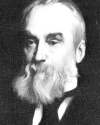 (source)
(source)
|
John Hughlings Jackson
(4 Apr 1835 - 7 Oct 1911)
English neurologist who has been called the 'Father of English Neurology.' He pioneered the clinical investigation of epilepsy (1861-1902).
|
Science Quotes by John Hughlings Jackson (3 quotes)
For in disease the most voluntary or most special movements, faculties, etc., suffer first and most, that is in an order the exact opposite of evolution. Therefore I call this the principle of Dissolution.
— John Hughlings Jackson
'On the Anatomical and Physiological Localisation of Movements in the Brain' (1875), Preface. In James Taylor (ed.), Selected Writings of John Hughlings Jackson, Vol. 1 (1931), 38.
It has been said that he who was the first to abuse his fellow-man instead of knocking out his brains without a word, laid thereby the basis of civilisation.
— John Hughlings Jackson
'On affections of Speech from the Disease of the Brain' (1878). In James Taylor (ed.), Selected Writings of John Hughlings Jackson, Vol. 2 (1932), 179.
The doctrine of evolution implies the passage from the most organised to the least organised, or, in other terms, from the most general to the most special. Roughly, we say that there is a gradual 'adding on' of the more and more special, a continual adding on of new organisations. But this 'adding on' is at the same time a 'keeping down'. The higher nervous arrangements evolved out of the lower keep down those lower, just as a government evolved out of a nation controls as well as directs that nation.
— John Hughlings Jackson
'Evolution and Dissolution of the Nervous System', British Medical Journal (1884), I, 662.
See also:
- 4 Apr - short biography, births, deaths and events on date of Jackson's birth.
 In science it often happens that scientists say, 'You know that's a really good argument; my position is mistaken,' and then they would actually change their minds and you never hear that old view from them again. They really do it. It doesn't happen as often as it should, because scientists are human and change is sometimes painful. But it happens every day. I cannot recall the last time something like that happened in politics or religion.
(1987) --
In science it often happens that scientists say, 'You know that's a really good argument; my position is mistaken,' and then they would actually change their minds and you never hear that old view from them again. They really do it. It doesn't happen as often as it should, because scientists are human and change is sometimes painful. But it happens every day. I cannot recall the last time something like that happened in politics or religion.
(1987) -- 


